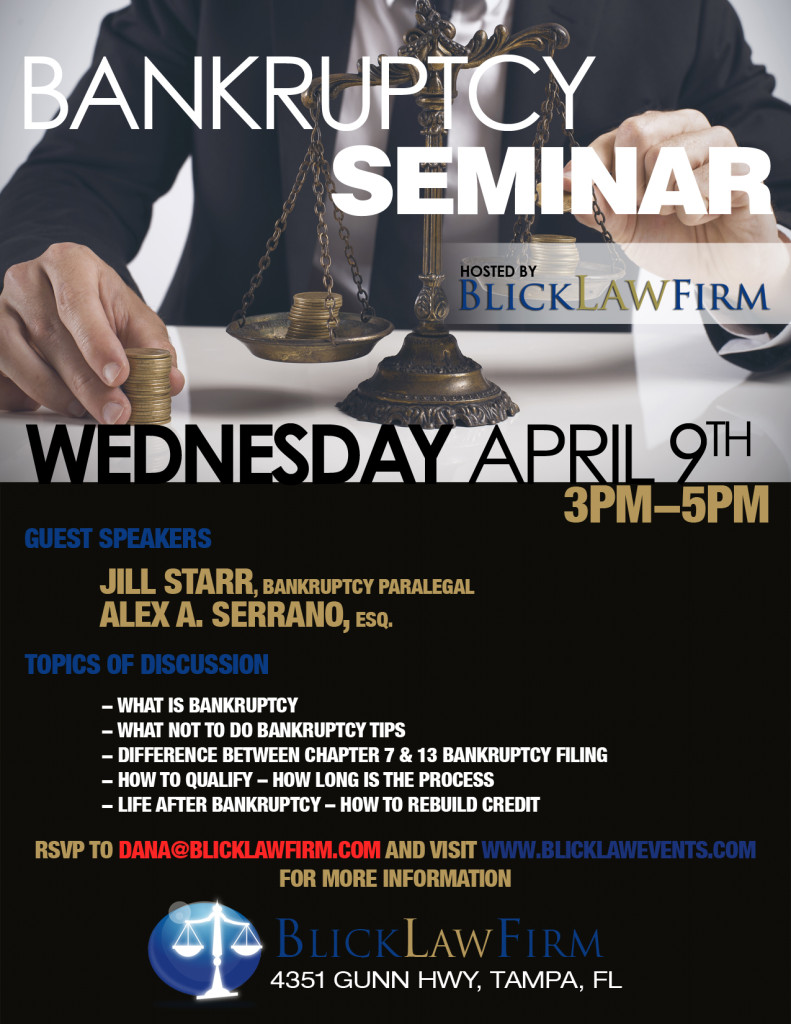Sign Up Today!
-
Latest News
- Blick Law Firm Works Closely with Tampa’s Chiropractic and Acupuncture Clinic
- Blick Law Firm Brings Legal Expertise and Christian Values to Tampa
- What can a personal injury attorney do for you?
- The Importance of a Real Estate Attorney in a New Transaction
- Over 150 New Florida Laws Take Effect this Month
- Law Change Protects Florida Patients From Balance Billing
- Fatal Alligator Attack at Disney World Orlando Could Mean Legal Trouble
- Florida Gun Laws Under Fire After Orlando Attacks
- Prospect of Medical Marijuana in Florida Creates Buzz
- Florida’s Death Penalty System Subject to Further Questioning
- Summer Driving Safety Tips
- Florida Supreme Court Votes to Maintain Reasonableness in Workers’ Compensation Law
Tags
abogado cristiano abogado de lesiones personales abogado en tampa abogados abogados en tampa abogados real estate abogados tampa accident attorney accident attorneys attorney for the defense attorneys in tampa auto accident bancarotta en tampa bankruptcy attorney blick law firm carrollwood carrollwood attorney carrollwood businesses carrollwood law firm carrollwood real estate christian attorney christian law association christian law firm christian lawyer christian lawyers christian lawyers association christian lawyer tampa driving under the influence helping the hurting michael c blickensderfer military lawyer military lawyers minute with mike personal injury personal injury attorney personal injury attorneys personal injury lawyer personal injury lawyers real estate law tampa attorney tampa law firm tampa personal injury attorney tampa real estate attorney veterans veterans lawyer
Tag Archives: tampa bankruptcy attorney
Bankruptcy Class | Public Seminar | Free Legal Aid

Blick Law Firm will be hosting a free informational bankruptcy seminar on Wednesday, April 9th from 3 to 5 pm. The seminar will be held at Blick Law Firm’s previous office at 4351 Gunn Highway in Tampa. Bankruptcy paralegal Jill Starr, and attorney Alex A. Serrano will be providing in depth information in regards to what bankruptcy is, how it can be useful, and the distinctions between chapter 7 and 13. Information concerning what not to do preceding and during your bankruptcy case will also be discussed, along with a “life after bankruptcy” session, and more important and useful information.
What is bankruptcy?
Bankruptcy is a legal degree of a person or business that is unable to pay their debt to creditors. Bankruptcy is appointed by a court order that is generally proposed by the debtor. Filling for Bankruptcy is common in the state of Florida, and can safeguard and provide comfort for those overwhelmed with debt. What Bankruptcy laws do is liquidate assets, so that debts can be paid. Repayment plans are also made in order for those in debt to have a new financial beginning.
Bankruptcy cases are generally filed under Chapter 7 or Chapter 13 of the Bankruptcy Code.
Chapter 7 or Straight Bankruptcy, eradicates all debts excluding the following:
- Child support
- Alimony
- Most student loans
- Most recent back taxes
- Recent large purchases of more than $550 for luxury goods bought within 90 days of filing
- Fraudulent debts
- Cash advances of $825 within 70 days of filing
- Fines or penalties of government agencies
Chapter 13 or Wage Earner Bankruptcy creates a repayment plan that allows you to pay back your debts over several years’ time.
It is very important that the information and paperwork are filed correctly to ensure that your bankruptcy claim is successful. The experienced bankruptcy attorneys at Blick Law Firm can assist with your bankruptcy claim, and help to make sure that the proper steps and precautions are being made when filing.
If you or a loved one is thinking about filing for bankruptcy, Blick Law Firm can help you secure the full benefits to which you are entitled, and help to maximize your recovery.
Posted in Bankruptcy, Blog
Tagged bankruptcy laws, chapter 13, chapter 7, filing bankruptcy, tampa bankruptcy attorney
Leave a comment
Bankruptcy: Secured vs. Unsecured Debt
 Many people, when going through Bankruptcy, have common questions about the different terms encountered while going through the Bankruptcy process. Understanding the difference between Unsecured and Secured Debt can be confusing, and it is important to be well informed when considering whether or not to file for Bankruptcy.
Many people, when going through Bankruptcy, have common questions about the different terms encountered while going through the Bankruptcy process. Understanding the difference between Unsecured and Secured Debt can be confusing, and it is important to be well informed when considering whether or not to file for Bankruptcy.
Secured Debt is debt that has a security interest or collateral tied to the agreement, whereby creditors can repossess or foreclose on the collateral if the debtor fails to pay back the loan. Common examples of Secured Debt are home mortgages or car loans; in the event the debtor cannot pay the amount owed, the loan is secured by the ability of the creditor to repossess the home or the car.
On the other hand, unsecured debt is debt that has no collateral attached to the agreement. Instead, unsecured creditors generally rely on your credit score and issue credit based on good faith that you will repay the amount loaned. Common examples of unsecured debt are credit card bills, medical bills, and utilities bills.
Upon filing for Bankruptcy, most Unsecured Debt is discharged with the exception of Student Loans, Child Support and Alimony Payments, Court Fines, DUI judgments against the debtor, and debts incurred by Fraud. The discharge of unsecured debt is a primary benefit of filing for Bankruptcy, and comes along with an Automatic Stay against creditors pursuing their collection efforts.
Understand that filing for Bankruptcy is a complex process with important benefits, consequences, and alternatives to consider. In the event you are considering Bankruptcy, call Blick Law Firm today for help at (813) 931-0840. Schedule a free 15 minute consultation with attorney Michael Blickensderfer. Think quick, call Blick!
Posted in Bankruptcy, Blog
Tagged abogados, abogados en tampa, abogados tampa, bad credit personal loans, bankruptcy, bankruptcy attorneys tampa, bankruptcy filing, bankruptcy lawyers, blick law firm, carrollwood attorney, carrollwood law firm, chapter 7, christian attorney, christian council, christian law association, christian lawyers, filing bankruptcy, michael c blickensderfer, personal loans bad credit, secured vs unsecured loans, tampa bankruptcy attorney, tampa bankruptcy lawyer, unsecured loan, unsecured loans, unsecured personal loan, unsecured personal loans, unsecured personal loans bankruptcy, what is chapter 7 bankruptcy
Leave a comment
Tampa Attorneys
Blick Law Firm offers a wide array of legal services to help serve the public including Personal Injury, Criminal Law, Real Estate, and Bankruptcy; we also provide help in Family and Probate Law matters. As a result, our blog topics range from auto accidents to short sales.
Grounded in Christian values, Blick Law Firm strives to not only meet the legal needs of its clients and their families, but also to provide physical and emotional support. We treat each client equally and with the utmost respect; offering high-quality legal representation and counsel to those who need us most. We pride ourselves on our motto of Helping the Hurting, and reach out to the community in a variety of ways.
Our website Blicklawfirm.com provides useful information on our blog that may be helpful in addressing your legal concerns; additionally, we offer details about our services aimed at providing reassurance that your legal needs will be handled effectively. With over 25 years of knowledge and practice, including a broad range of trial and courtroom experience, we will work hard for you.
If you or a loved one have legal concerns and are seeking quality legal representation, call Blick Law Firm today at (813) 931-0840. Schedule a free 15-minute consultation with attorney Michael Blickensderfer. Think quick, call Blick.
Posted in Bankruptcy, Blog, Criminal Law, Personal Injury, Real Estate
Tagged abogado en tampa, abogados lawyers, attorney tampa, attorneys tampa, bankruptcy attorney, christian attorneys, christian lawyer, find a lawyer, lawyer free consultation, lawyer search, lawyers in tampa, real estate attorney tampa, tampa accident attorney, tampa attorneys, tampa bankruptcy attorney, tampa criminal attorney, tampa defense attorney, tampa dui attorneys, tampa florida attorneys, tampa personal injury attorney
Leave a comment
Chapter 13 Bankruptcy
 Bankruptcy is a complex area of law and involves many considerations, including whether to file, determining which type of Bankruptcy to file, the use of exemptions, understanding the protections of the Bankruptcy Code and using them to your advantage.
Bankruptcy is a complex area of law and involves many considerations, including whether to file, determining which type of Bankruptcy to file, the use of exemptions, understanding the protections of the Bankruptcy Code and using them to your advantage.
Many people utilize bankruptcy as a strategy for resolving unmanageable debt. Today, it is more common than most realize and can be a refreshing solution to a debt-ridden life.
When considering Bankruptcy, a Chapter 7 filing is a useful way to discharge of most debt and can relieve the burden of creditor collection attempts. However, many times a debtor has equity in a home or property and would like to file for Bankruptcy but not surrender their home. In these cases, a debtor can reaffirm the debt for the particular property they would like to maintain and keep making the payments, or file for Chapter 13 Bankruptcy which allows the debtor to reorganize the debt into a consolidated and more manageable payment.
Chapter 13 Bankruptcy gives the debtor an opportunity to manage their debt over a period of 3 to 5 years and still maintain the rights to both exempt and non-exempt property. This is particularly useful when the debtor has a large amount of equity in the home or property. Chapter 13 also helps by reducing payments on debts that cannot be discharged by Chapter 7, such as Student Loans; additionally, Chapter 13 helps avoid wage garnishment, delays the foreclosure process on the home, protects co-signers, and allows for an overall extension on the repayment term of most debts.
However, the decision to declare Bankruptcy also comes with consequences. The disadvantages of filing Chapter 13 include:
- Credit reports will show a Chapter 13 Bankruptcy filing for 7 years
- The debtor will receive high interest rates on future credit
- The debtor will have a strict budget in place in order to ensure the reorganized debt payments
- Legal representation fees tend to be higher, plus added court costs
If you are having trouble meeting your debt obligations, consult an experienced Tampa Bankruptcy attorney to discuss your options.
Call Blick Law Firm today at 813-931-0840. Make an appointment for a free 15 minute consultation with Michael Blickensderfer to see if Bankruptcy is right for you.
Posted in Bankruptcy, Blog
Tagged abogados, abogados tampa, bankruptcy, bankruptcy attorneys tampa, bankruptcy chapter 13, blick law firm, carrollwood attorney, carrollwood law firm, chapter 13, chapter 7, christian attorney, christian council, christian law association, christian lawyers, file chapter 13, file chapter 13 bankruptcy, file chapter 7 bankruptcy, filing a chapter 13, filing bankruptcy, filing chapter 13 bankruptcy, filing chapter 7, filing for chapter 7, how to file a chapter 13, michael c blickensderfer, tampa bankruptcy attorney, tampa bankruptcy lawyer
Leave a comment
Secured vs. Unsecured Loans
 Many people, when going through Bankruptcy, have common questions about the different terms encountered while going through the Bankruptcy process. Understanding the difference between Unsecured and Secured Debt can be confusing, and it is important to be well informed when considering whether or not to file for Bankruptcy.
Many people, when going through Bankruptcy, have common questions about the different terms encountered while going through the Bankruptcy process. Understanding the difference between Unsecured and Secured Debt can be confusing, and it is important to be well informed when considering whether or not to file for Bankruptcy.
Secured Debt is debt that has a security interest or collateral tied to the agreement, whereby creditors can repossess or foreclose on the collateral if the debtor fails to pay back the loan. Common examples of Secured Debt are home mortgages or car loans; in the event the debtor cannot pay the amount owed, the loan is secured by the ability of the creditor to repossess the home or the car.
On the other hand, unsecured debt is debt that has no collateral attached to the agreement. Instead, unsecured creditors generally rely on your credit score and issue credit based on good faith that you will repay the amount loaned. Common examples of unsecured debt are credit card bills, medical bills, and utilities bills.
Upon filing for Bankruptcy, most Unsecured Debt is discharged with the exception of Student Loans, Child Support and Alimony Payments, Court Fines, DUI judgments against the debtor, and debts incurred by Fraud. The discharge of unsecured debt is a primary benefit of filing for Bankruptcy, and comes along with an Automatic Stay against creditors pursuing their collection efforts.
Understand that filing for Bankruptcy is a complex process with important benefits, consequences, and alternatives to consider. In the event you are considering Bankruptcy, call Blick Law Firm today for help at (813) 931-0840. Schedule a free 15 minute consultation with attorney Michael Blickensderfer. Think quick, call Blick!
Posted in Bankruptcy, Blog
Tagged abogados, abogados en tampa, abogados tampa, bad credit personal loans, bankruptcy, bankruptcy attorneys tampa, bankruptcy filing, bankruptcy lawyers, blick law firm, carrollwood attorney, carrollwood law firm, chapter 7, christian attorney, christian council, christian law association, christian lawyers, filing bankruptcy, michael c blickensderfer, personal loans bad credit, secured vs unsecured loans, tampa bankruptcy attorney, tampa bankruptcy lawyer, unsecured loan, unsecured loans, unsecured personal loan, unsecured personal loans, unsecured personal loans bankruptcy, what is chapter 7 bankruptcy
Leave a comment
Chapter 7 and Chapter 13 Bankruptcy basics
 Available Bankruptcy claim types vary depending on your particular situation, and understanding the differences is important.
Available Bankruptcy claim types vary depending on your particular situation, and understanding the differences is important.
Chapter 7 Bankruptcy is a liquidation proceeding whereby the debtor turns over all non-exempt property to the bankruptcy trustee who then converts it to cash to pay off the creditors. Usually within four months the debtor then receives a discharge of all dischargeable debts. Usually, these dischargeable debts include your credit card debt, old medical bills, utilities bills, unsecured loans, pay day loans, and most other types of unsecured debt.
Chapter 7 Bankruptcy is generally available when the debtor has little property aside from the basic necessities like furniture and clothing; and the debtor has difficulty making payments on basic expenses, or has very little money left after doing so.
The advantage to filing Chapter 7 Bankruptcy is that your unsecured debt is completely eliminated, the process is fairly quick, and the automatic stay that takes place after filing prohibits creditors from making collection efforts.
Chapter 13 Bankruptcy is more of a reorganization process that is available to debtors who have significant equity in a home or other property and want to keep it, or maintain a regular income but simply can’t keep up with the scheduled payments on their debts. Chapter 13 Bankruptcy allows the debtor to restructure the debt to have it paid off over a period of three to five years.
The advantage to filing Chapter 13 Bankruptcy is that you can maintain your property while spreading out the payments, you will have three to five years to catch up on delinquent accounts, and during that time you will make only one monthly payment to the bankruptcy trustee for payment to all creditors involved.
No matter what your situation is, obtaining quality legal consultation from an experienced bankruptcy attorney is beneficial. Contact Blick Law Firm today at (813) 931-0840. Schedule a free 15 minute consultation with attorney Michael Blickensderfer to assess what option is best for you. Think quick, call Blick!
Posted in Bankruptcy, Blog
Tagged abogados, abogados en tampa, abogados tampa, bankruptcy, bankruptcy attorneys tampa, bankruptcy filing, bankruptcy lawyers, blick law firm, carrollwood attorney, carrollwood law firm, chapter 7, christian attorney, christian council, christian law association, christian lawyers, filing bankruptcy, michael c blickensderfer, tampa bankruptcy attorney, tampa bankruptcy lawyer, what is chapter 7 bankruptcy
Leave a comment















